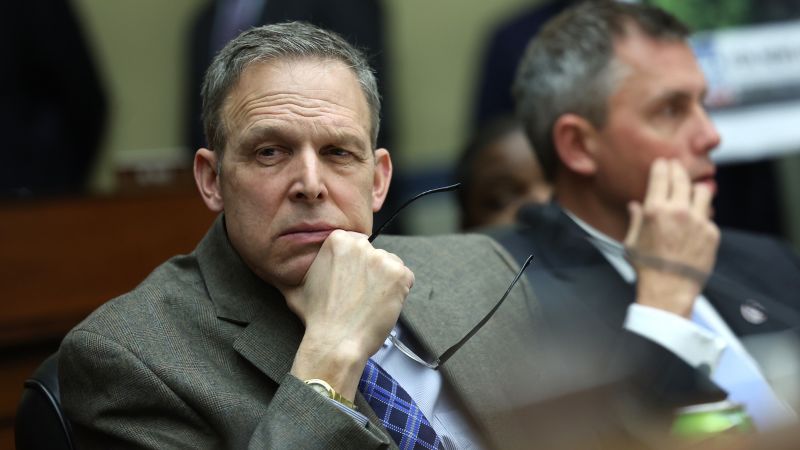
CNN
—
The seized cell phone of Rep. Scott Perry contained 930 records where the Pennsylvania Republican often tried to cajole executive branch officials around the 2020 presidential election, according to newly released court papers in the fight over his cell phone data.
“Rep. Perry’s communications with Executive Branch officials, as reflected in the responsive records, demonstrate that he welcomed, rather than resisted, and indeed often initiated these communication [redacted],” Chief Judge Beryl Howell of the DC District Court wrote in one of four unsealed opinions, after she had reviewed the records and decided to release them to prosecutors.
Around the 2020 election, the Pennsylvania lawmaker had been in touch with President Donald Trump and powerful Trump backers, including White House chief of staff Mark Meadows, Justice Department official Jeffrey Clark and others who pushed false claims of election fraud.
His communications with the executive branch, she wrote, were “proactive, persistent and protracted.”
The newly available court records provide more insight into the scope of the ongoing fight over Perry’s phone, which is part of special counsel Jack Smith’s criminal investigation around January 6, 2021. In total, Howell on Friday unsealed four opinions with redactions that she wrote related to the Justice Department’s ability to access more than 2,200 records on the congressman’s cell phone, after the FBI seized the device last year.
Howell also called Perry’s phone compendium a “multi-pronged push for Executive Branch officials to take more aggressive action,” likely in response to suspicions of election fraud, and deemed those cell phone records not covered by congressional protection.
In another part of her rulings, Howell wrote how Perry’s communications with private individuals shouldn’t stay secret from investigators, either – including almost 700 records showing his interest in election security and electors as well as contact with Trump campaign attorneys.
“What is plain is that the Clause does not shield Rep. Perry’s random musings with private individuals touting an expertise in cybersecurity or political discussions with attorneys from a presidential campaign, or with state legislators concerning hearings before them about possible local election fraud or actions they could take to challenge election results in Pennsylvania,” Howell wrote.
While Howell ultimately let Perry keep about 161 of his records from investigators under the Constitution’s Speech or Debate Clause – a provision that shields legislators from certain law enforcement actions targeting conduct related to their legislative duties – she ordered that the 2,000 other records be given to Justice Department investigators.
The inquiry is now part of special counsel Smith’s January 6 investigation.
Perry has appealed her ruling, managing to keep secret all 2,000 records for almost seven months since his phone’s seizure, and the DC Circuit Court of Appeals heard arguments in the case on Thursday.
Because some of those arguments were public, Howell released redacted versions of her opinions and orders in the case Friday night.
She largely rejected Perry’s arguments for privacy, calling his approach to the case an “astonishing view of the scope of the legislative privilege” that would “truly cloak Members of Congress with a powerful dual non-disclosure and immunity shield for virtually any of their activities that could be deemed information gathering about any matter which might engage legislative attention.”
The unsealed court orders also provided more insight into the search itself, and how the case came to be.
After Perry’s phone was seized and copied by FBI agents on August 9, the Justice Department returned to court for a warrant to review the contents of his phone.
Nine days later, Howell approved the warrant, “finding probable cause that a crime was committed” and that evidence of the crime would be found on Perry’s phone, according to the unsealed opinions.
Perry had 44 days to argue to the court his Speech or Debate privileges as a member of Congress, which could protect records of legitimate legislative activity from the federal investigation. He told the court his phone contained “communications with his staff, members of Congress, and others” – then logged records on his phone, including “Notes,” by date, recipient, sender and subject matter for a judge to consider.
Howell then went through those records.
Perry has not been charged with a crime.
Howell last November showed concern that Perry’s team was trying to “unilaterally delay” the criminal investigation.
The court fight itself has put on hold DOJ’s ability to access the content of Perry’s phone. And, Howell accused Perry’s team of slow-walking the work on the case, as their review of the contents of the phone last fall went slowly as the litigation moved forward.
His team was reviewing his phone records for possible privilege assertions at a rate of 265 documents a day, the Justice Department told the judge, while the court had ordered them to review records at a rate of 800 a day, according to one of the opinions released Friday.
“If Rep. Perry has indeed significantly deviated from the pace required under the Perry Privilege Log Order, and he continues to slow-walk producing privilege logs to the government … he risks forfeiting his right to assert his privilege,” she wrote in November. “Rep. Perry is now on notice to speed up his review.”
The timing of his documents review didn’t arise again in Howell’s future opinions, according to the redacted now-released court records.
This story has been updated with additional details.
Note:- (Not all news on the site expresses the point of view of the site, but we transmit this news automatically and translate it through programmatic technology on the site and not from a human editor. The content is auto-generated from a syndicated feed.))



